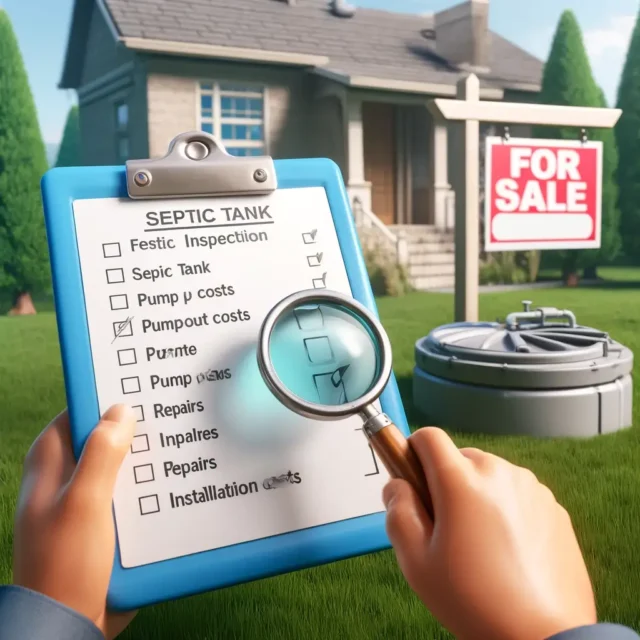Owning a home with a septic tank in Massachusetts means more than having a place to call your own. This means you must maintain and fix this waste system. Just like you would know where your kitchen is, you should know where your septic tank lies and how old it is.
Now, you might think that only the house itself needs checking during the property inspection before buying. Yet, along with the roof, furnace, and plumbing or electrical wiring, the septic system requires an expert’s check. That’s the ticket to avoiding unpleasant surprises after everything’s signed and done.
Luckily for home buyers in Massachusetts, sellers must inspect their septic systems before closing. The regulation imposing this requirement is Title V.
When buying a house with a septic tank, you must familiarize yourself with inspection, maintenance, and replacement laws. Additionally, inspecting the septic system for pipe integrity, ventilation, drainage, and potential problems is essential. Regular maintenance is necessary, including inspections, maintenance, and draining every few years for $300-$700.
From three decades of experience as a Massachusetts Realtor, it is crucial for buyers purchasing a home with a septic system to understand how they function and their maintenance requirements. Without this knowledge you can jepordize the chances of the system lasting as it should.
Let’s look at everything you should know.
What to Know About Buying a Massachusetts Property with a Septic Tank
Imagine discovering your dream home in a scenic spot, only to find out it has a septic tank instead of being connected to a municipal sewer system. For some, that might sound like an unwelcome surprise, but it can be a viable and functional option for many.
However, it’s essential to understand that a septic tank has additional responsibilities and considerations. So, what are the key points to consider when purchasing a property with a septic tank?
First, it’s crucial to recognize that once you buy a home with a septic system, you become responsible for its maintenance and repairs. Homeowners are on the hook for septic system upkeep, unlike those connected to city sewer systems, where the city or town handles most maintenance.
Understanding the local regulations and laws regarding septic tank inspection, maintenance, and replacement is vital. The septic system must be inspected every three years for pipe integrity, ventilation, drainage, and potential problems.
I have owned a few homes with septic systems. As long as you keep up with maintenance, you’ll likely have no issues.
Get a Copy of The Title V Inspection Report
Before finalizing the purchase of a property with a septic tank, it’s essential to have a copy of the septic system inspection report, called the Title V report. This step is crucial because, if handled properly, problems with the septic system can lead to expensive fixes.
Knowing the specifications of the septic tank is also vital—its size and installation date are pertinent details every homeowner should be aware of.
Moreover, being informed about the septic tank’s inspection history reveals any previous issues and provides insight into how well-maintained the system is.
It’s also worth noting that septic systems in Massachusetts usually need replacement every 20 to 40 years, at an estimated cost between $15,000 and $50,000. Being aware of these potential future costs can significantly impact your decision when purchasing a property with a septic tank.
In addition, regular maintenance is necessary for a septic tank’s longevity. From inspections to maintenance and draining every few years, the cost ranges between $300 and $700. It’s all part of ensuring a properly functioning system.
Taking proactive measures such as using biological additives that increase microbes breaking down sludge and scum in the tank contributes significantly to its health and functionality.
Understanding these crucial details about owning a property with a septic tank will give you essential knowledge as you decide.
The Seller Will Have a Property Inspection for Septic System Issues
A comprehensive septic system inspection is crucial when purchasing a property with a septic tank in Massachusetts. Think of it as getting a health check-up for your prospective home—just like attending regular health screenings.
Before committing to such a property, the owner will hire a professional septic service company. These inspections can reveal vital information about the septic system’s condition, providing insight into potential problems like drainage issues, leaks, or signs of system failure.
An in-depth examination should cover various aspects of the septic system beyond routine checks. This entails checking for the tank and pipes’ cracks, corrosion, or damage. Inspectors will also assess the drainage field’s proper functioning and verify that solids are not clogging the system and causing backup issues.
They will also evaluate signs of leaks or groundwater infiltration and test the ventilation system to ensure adequate airflow within the tank.
The goal of these inspections is to identify existing issues and anticipate potential problems down the line. By proactively addressing any red flags during the inspection process, you can avoid costly surprises and make informed decisions about purchasing the property.
Consider this inspection your chance to peek behind the curtains and discern the actual condition of the septic system. It’s akin to taking a test drive before buying a car. You want to ensure everything works smoothly and no hidden malfunctions are waiting to disrupt your peace of mind.
As daunting as this process may sound, remember that investing time and resources in thorough property inspections now can save you from significant expenses and headaches in the future.
Check The Bedroom Capacity
One of the things I recommend you check is the septic system bedroom capacity. Sellers cannot market their homes as having more bedrooms than the system capacity.
For example, if Title V states the home has a three-bedroom septic system, the property cannot be marketed as a four-bedroom, even if one exists.
This is one area where sellers and real estate agents can be caught misrepresenting a property, leading to lawsuits. Imagine thinking you’re buying a four-bedroom home when, in reality, you’re not.
Part of determining a home’s market value is bedroom counts.
The Installation and Maintenance of a Septic Tank
When owning a home with a septic system, installing the septic tank is a crucial step that demands adherence to local regulations. Septic system regulations can vary by location, and it’s essential to understand and comply with these guidelines.
This typically involves obtaining the necessary permits and ensuring the septic tank is installed appropriately from your home, well, and property boundaries.
Septic Tank Installation Cost
| Details | Cost Range |
|---|---|
| Average cost of septic tank installation | $3,000 to $7,000 |
Following the installation, regular maintenance becomes a cornerstone of responsible homeownership. Scheduled inspections help identify potential issues early on, preventing more significant problems and costly repairs. In addition, proper maintenance extends the lifespan of your septic system by averting common issues associated with neglect.
Maintenance Requirements
- Septic tanks need regular inspections, maintenance, and pumping every few years.
- Estimated cost for carrying out these tasks: $300 to $700.
Using biological additives can significantly contribute to maintaining a healthy septic system by promoting the breakdown of sludge and scum within the tank. These natural additives introduce beneficial bacteria into the septic tank. They aid in decomposing waste materials and reducing the need for more frequent pumping.
Key Takeaway: By complying with local regulations during installation and prioritizing regular maintenance practices, homeowners can take proactive steps toward ensuring their septic systems’ optimal performance and longevity while minimizing potential issues and expenses in the long run.
Financial considerations can significantly impact your budget and future expenses when buying a property with a septic tank. Let’s explore what you should consider when determining the costs associated with this type of homeownership.
Cost Considerations When Buying a Home with a Septic System
Buying a home is one of the most substantial investments you’ll ever make. And when that home comes with a septic tank, it introduces a whole new set of cost considerations.
The last thing you want is to be caught off guard by unexpected expenses related to the septic tank. So, let’s break down the main cost factors you must consider with a home that has a septic system.
Pumping and Regular Maintenance
Regular maintenance, such as pumping, is essential for a septic system’s proper functioning and longevity. The United States Environmental Protection Agency (EPA) recommends pumping residential septic tanks every three to five years for conventional systems.
Additional Budgetary Factors
In addition to the initial evaluation and potential replacement costs, other budgetary factors should be considered. These include regular inspections, potential repairs for any wear or damage found during an inspection, and emergency repair costs if significant issues arise after purchasing the property.
Long-term Perspective
Despite these potential costs, it’s essential to recognize that well-maintained septic systems can function efficiently for many years. By taking proactive measures, such as regular inspections and maintenance, you can significantly extend the system’s lifespan while minimizing unexpected financial burdens.
When considering these costs, it’s essential to think long-term. Investing in proper maintenance can help eliminate expensive repairs in the future. By putting effort into maintaining your septic system correctly, you’re also preserving the value of your property.
Understanding these cost considerations is essential for planning and budgeting. By being aware of these potential costs and factoring them into your decision-making process, you’ll be better prepared for homeownership with a septic system.
Signs of Septic System Problems
When you move into a Massachusetts house with a septic tank, there are certain things you need to watch out for. One of the biggest problems people face is when the septic system starts acting up, causing a mess no one wants to deal with.
So, it’s essential to know what to look for so that you can catch these issues early and avoid any nasty surprises.
Red Flags and Warning Signs
One of the first signs that something might be off is if you notice an unusual smell coming from your drains or yard. The odor could be anything from a lingering sewage smell in your yard to gurgling sounds in your plumbing fixtures when you use the water.
If you notice anything like this, don’t ignore it – these are red flags that something might be wrong with the septic system.
It’s crucial not to disregard even minor signs. Unusual smells and odd plumbing sounds are often the first indicators of a potentially serious septic system issue. These are signs your septic tank needs to be pumped.
Another sign to watch out for is if your sinks, bathtubs, or toilets are draining slower than usual. This is usually not a good sign. It could mean that there’s a clog somewhere in the pipes or in the septic tank itself. This backup could lead to overflows and backups, which will cause damage and require expensive repairs.
Any slowdown in drainage should be taken seriously. It can indicate potential blockages in the system leading to costly consequences if left unchecked.
Some might think these things are minor and temporary, but remember, small issues can turn big if they’re not promptly resolved. Furthermore, addressing potential problems early is crucial rather than waiting until they grow into more severe concerns.
Prompt action is critical when dealing with signs of potential septic problems. What may initially seem insignificant can quickly escalate into significant inconveniences and health hazards. This issue can be even more crucial when buying on the water.
Pros and Cons of Buying With a Septic Tank
Pros
- Cost Efficiency: Once installed, septic systems can be more cost-effective over time since they don’t require monthly sewage bills. One of the things I have loved about having a septic system is not getting a monthly or quarterly sewer bill.
- Environmentally Friendly: Properly maintained septic systems can be more environmentally friendly, as they naturally filter wastewater before releasing it.
- Self-Contained System: Homeowners aren’t dependent on municipal sewage services. It makes them more self-sufficient and potentially reduces costs. From experience, this is undoubtedly the case.
- Rural Suitability: Septic tanks are often the only option in rural areas without access to municipal sewage systems.
- Long Lifespan: With regular maintenance, septic systems can last several decades.
Cons
- Maintenance Requirements: Regular maintenance and pumping every few years are necessary to prevent system failure and costly repairs.
- Potential for Issues: If not properly maintained, septic systems can back up, leak, or cause other serious issues.
- Initial Installation Cost: A septic system can be expensive, particularly in challenging soil conditions. The two homes I have custom-built had septic systems that cost around $25,000. Many homes I have sold that had to replace their systems cost between $20,000 and $30,000.
- You May Need to Upgrade: If you want to add an addition to your home, you could be required to upgrade your system. This is highly likely when adding a bedroom.
- Limited Capacity: Septic tanks have a limited capacity and might not handle excess water usage from large families or multiple households.
- Environmental Risk: Poorly maintained or old septic systems can cause contamination of local water supplies, posing health and environmental risks.
- Regulatory Compliance: Some areas have strict regulations regarding septic systems, including inspection requirements and potential upgrades.
Conclusion
Watching for unusual happenings or smells around your home is always best. Recognizing these signs early on can save you time, money, and stress by addressing problems before they escalate into significant issues.
Proactively identifying and addressing potential septic system problems can mitigate unexpected complications after a home purchase. Your vigilance can lead to cost-effective solutions and prevent major disruptions.
If I can answer any questions about buying a house with a septic tank, please contact me.














No Comment